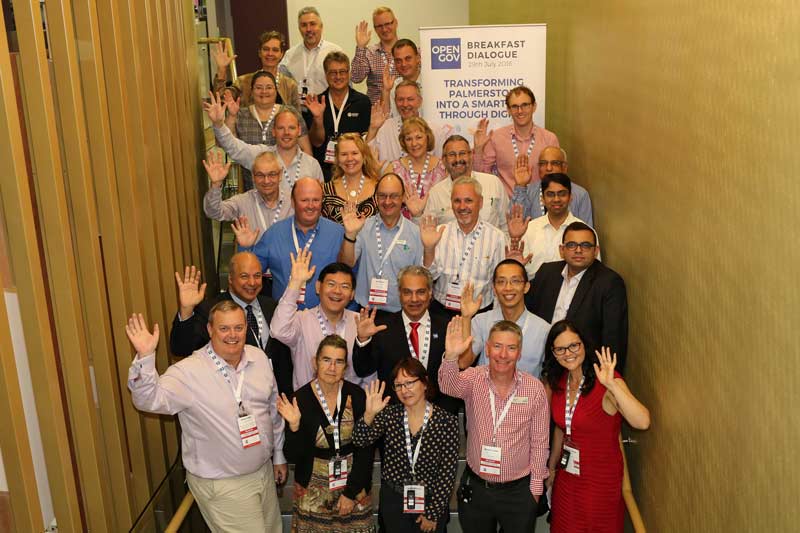
OpenGov Asia and its partner CISCO held an engaging breakfast dialogue in Palmerston, NT centred on the topic on how to approach Palmerston’s journey towards becoming a Smart City. It was OpenGov Asia’s inaugural event at Palmerston, which is the second biggest city with a population of 38,000 in NT just after Darwin city, which has a population of 50,000.
Delegates of the breakfast dialogue included several key local government officials, such as Mr. Ian Abbott (below left), Mayor of Palmerston City, Mr. Ricki Bruhn (below right), the CEO of Palmerston City and Ms. Seranna Shutt, Deputy Mayor of Palmerston City.
.jpg)
A full capacity of 28 delegates attended the dialogue and Mr. Mohit Sagar, Managing Director and Editor in Chief of OpenGov Asia, began the dialogue with a fundamental but important question: “What do we want a Smart City to be?”
.jpg)
Dr. Leong Mun Kew (above left), Deputy Director, Institute of Systems Science, NUS, who was also the invited speaker of the breakfast dialogue, then cited the example of Singapore’s journey towards becoming a Smart Nation which started in 1995: “Firstly, it’s about building a good infrastructure, such as having hyper-speed Internet access, which can support the Smart Nation. Next, you need to own what you have, understand it and having the technical savviness to change it. Nurturing a tech-savvy workforce that understands IT and applying it will also make a difference to other industries. Lastly, the government needs to set the pace and be way ahead of the private sector.”
Dialogue questions and discussion
The dialogue continued with a series of polling questions revolving on the topic of Smart Cities, which was the highlight of the event given the rigorous engagement and open sharing from the delegates. The question, “What is your primary objective from a Smart City?” drew lots of feedback from the floor with 57% citing providing enhanced services to citizens as most important:
.jpg)
“It’s actually knowing about an issue even before the citizen emails you about it. It’s about fixing an issue before it even occurs, to actively act before it happens. It’s about being proactive, not reactive”. -Ms. Wendy York, CIO, Dept of Infrastructure
“ ‘Innovation’ is one of those words that become like ‘gourmet’, it’s very overused, lots of people don’t even know what it means. For me, government has to be agile enough, recognise opportunities and make the most out of it. It’s about opening up our data and letting other people do the work for us. We have some great data from the Dept of Primary Industry and Fisheries, someone from Singapore or Adelaide may have an idea what to do with it. It’s not just about having sensors here and there, it’s about opening up our processes. We are working with organisations like GovHack, it’s about opening up our data and see where we can go.” -Mr. Rowan Dollar, CIO, Dept of Primary Industry and Fisheries, NT
“I found it hard to answer what’s the primary objective of a Smart City. It’s an unknown journey but it hinges on partnerships and for me business matters in this space. It’s about having to think smarter about how people flourish, how people make their choices and how technology contributes to that. For me, this is about the partnering between government and the private sector, it’s really important for the citizens and looking out for the opportunities that come out of collaboration.” -Ms. Jude Ellen, Member of the Advisory Committee to the Northern Territory, Minister for Corporate and Information Services
The question, “What is your concern in implementing a digital strategy?” 45% of the floor voted “We don’t know what we don’t know”, which was interesting to observe. Mr. Ricki Bruhn gave the example of the recent completion of a project at Goyder Square, which included adding of free WiFi services and a big TV screen for community updates: “People were initially resistant to change but once the projects came to fruition, they stopped because they realised that they benefitted from these changes.”
.jpg)
Mr. Brendan Dowd (above right), CEO, City of Darwin added: “One of the starting premises is understanding the objectives of the digital strategy. It does very much depend on the cultural environment, which is driven by the government leadership. The government needs to demonstrate that there’s something in it for everyone, you don’t get outcomes unless people start to say there’s something in it for me and that’s the real challenge.”
Mr. Glenn Ashe, former Australian government CIO and now part of the OpenGov Asia Team, responded to Mr. Dowd: “Change has to be driven by somebody, it’s not going to happen by itself, somebody has to pick it up and drive that idea. Somebody has to take ownership and leaders in the organisation, such as those who are in these room, we are the best people to drive that change. If we aren’t open to that, it’s not gonna happen. As leaders, the only way we are going to drive change is to do it ourselves”.
Ms. Sue McKinnon, Alder, City of Palmerston, explained that her main concern in implementing a digital strategy was data privacy and security. Dr. Leong replied with the example of Singapore in his capacity as a former Chief Data Security Officer at the National Library Board, explaining that the Singapore government creates trust with transparency in terms of what is done with the data, as well as ensuring data from various government agencies is protected and only shared with each other only on a need-to-know basis.
Subsequent polling questions were centred around the financial and operational aspects of implementing a digital strategy but the main highlight of the dialogue was really getting the delegates to spark off ideas and share relevant examples in their various positions in government in relation to the topic of digital transformation and strategy.
The dialogue was indeed a great opportunity for the delegates from government to engage in high-level discussions, something which was rare to come by. Based on the engaging topics and conversations at the dialogue regarding digital transformation in Palmerston and by extension, the Northern Territory, the region has great opportunities and potential to move towards becoming Smart Cities.
This development hinges on several key aspects: more collaboration between the public and private sectors, sharing and opening up of data as well as governments and its leaders taking the lead to drive change. With the right foundations set in place, it looks to be an exciting time of great change for the City of Palmerston.
















